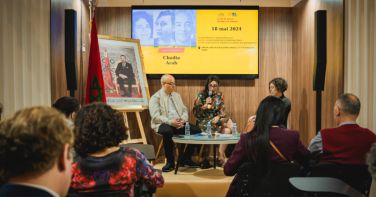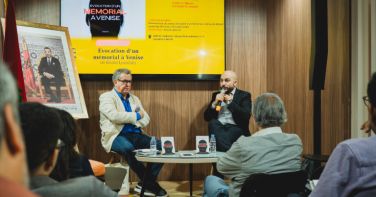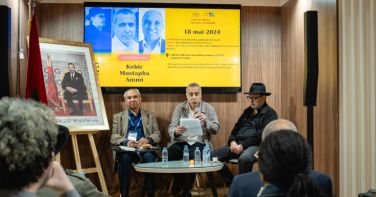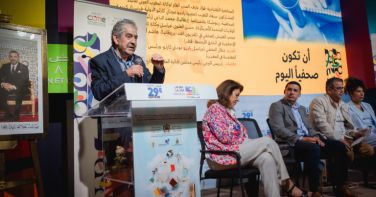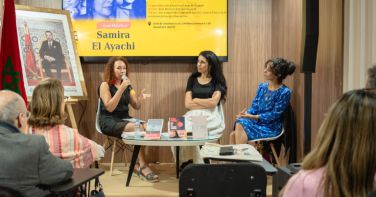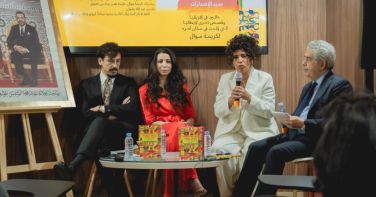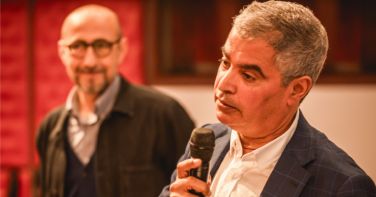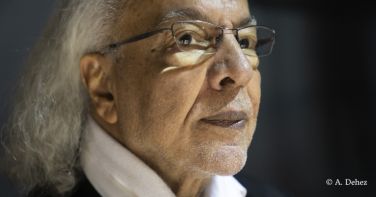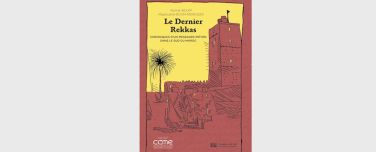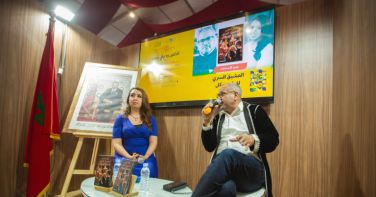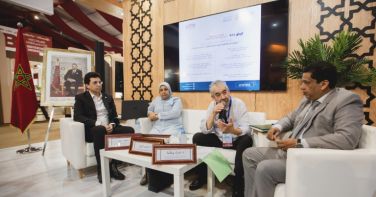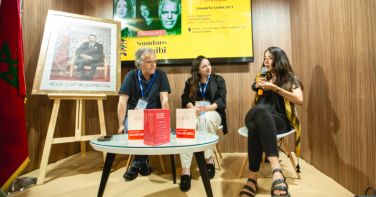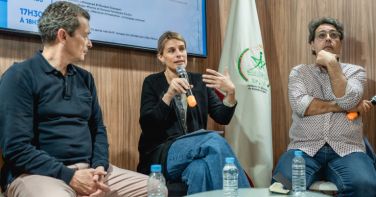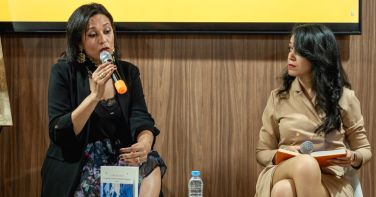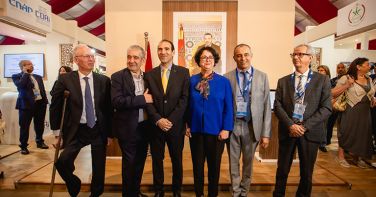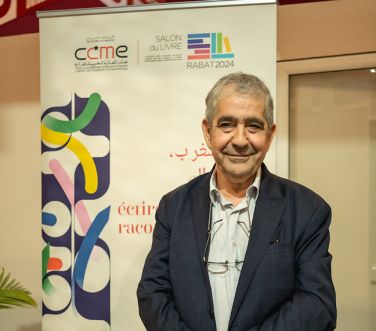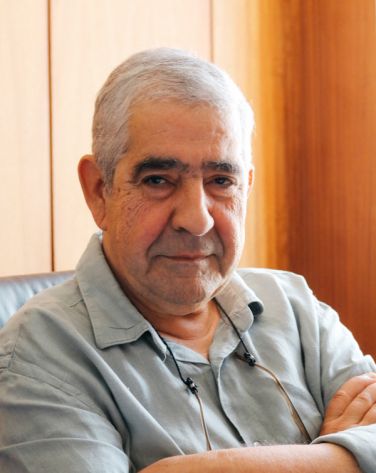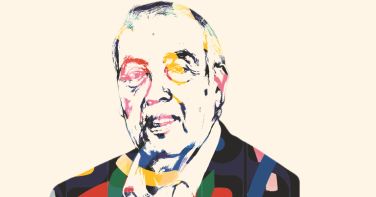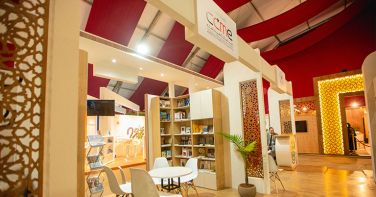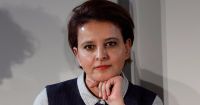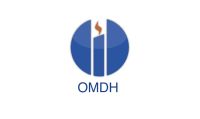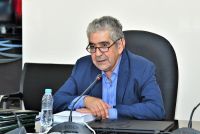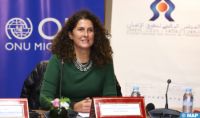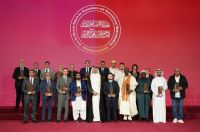The conference discussed the issue of how death is dealt with within the context of immigration, both in terms of immigrants losing their lives while attempting to cross the border to Europe, as well as the bodies of immigrants living abroad or descendants of immigrants, the procedures and rituals that follow death.
Siel-CCME: On Friday 17 May 2024, writer, speaker and engineer Khalid Lyamlahy was welcomed by the Council of the Moroccan Community Abroad (CCME) for a presentation of his novel "Evocation d'un mémorial à Venise.
He replied to questions from Younès Ajarraï, actor and cultural entrepreneur.
‘’What if we made arts and literature the bedrock of our horizon‘’ is the theme of the ‘’carte blanche‘’ meeting held by the Council of the Moroccan Community Abroad (CCME) during its attendance at the Rabat Book Fair. On Saturday 18 May 2024, the French-Moroccan dramatist and novelist Kebir Mustapha Ammi was joined by two of Morocco's leading cultural figures, the artist Fouad Bellamine and Driss Khrouz, former Director of the National Library of the Kingdom of Morocco and Director General of the Esprit de Fès Foundation and the Festival of Sacred Music.
CCME-Siel: A conference entitled “Being a journalist today”, initiated by the Club des journalistes accrédités au Maroc in partnership with the Council for the Moroccan Community Abroad (CCME), was held on May 17 at the Rabat book fair.
"Our bodies as battlefields: writing in the era of the feminist and humanist revolution" was the theme of the second round-table discussion organised by the Council of the Moroccan Community Abroad (CCME) at the Rabat Book Fair on Thursday 16 May 2024. A free discussion led by the French-Moroccan novelist Samira El Ayachi together with her guests,Rim Battal, a Moroccan poet and journalist living in France, and Fatima Ouassak, a French-Moroccan political scientist and lecturer.
On Wednesday May 15, 2024, as part of the Council of the Moroccan Community Abroad (CCME) program at the Rabat Book Fair, the Council's joint pavilion hosted Italian-Moroccan journalist Karima Moual, who introduced her book Cold in Italy and other stories of an Italy born elsewhere”, published by Luiss University (Rome).
The Renaissance cinema in Rabat hosted on the evening of 14 May 2024 the premiere of the 90-minute documentary "Mora est là", directed by Khalid Zaïri, a partnership between the Council of the Moroccan Community Abroad, the Hiba Foundation and the 2M TV channel.
On Wednesday 15 May 2024, the Council of the Moroccan Community Abroad (CCME) and the Cercle des Lauréats de Belgique (CLB), in partnership with the Délégation Générale Wallonie-Bruxelles au Maroc, paid tribute to the late Lahcen Zinoun, dancer, choreographer, writer, director and film-maker, at the Café de la Scène in Rabat (1st floor of the Cinéma Renaissance).
Omar Boum, a Moroccan anthropologist based in the United States and member of the Académie du Royaume, will be presenting his book "Le dernier Rekkas" (The Last Rekkas) on Friday 17 May 2024 at 6.30pm at the "Kitab" space of the Rabat Book Fair. "Le dernier Rekkas" is co-published by the CCME and the Langages du sud publishing house, and prefaced by Mr Driss El Yazami, President of the CCME.
"Mrs Merkel's secret lover" (in Arabic) by the German-Moroccan writer and journalist Rim Najmi-recently published by Dar Al-Masriah Al-Lubnaniah-was presented on Monday 13 May 2024 at the CCME stand. The author answered questions from German-Moroccan producer and journalist Mohamed Massad.
On Monday 13 May 2024, the President of the Council for Moroccan Community Abroad (CCME), Driss El Yazami, took part in a round table at the Ministry of Justice Pavilion of the Rabat Book Fair on the theme: ‘Justice in the service of Moroccans living abroad’. Mrs Zahira Fountir, Law Professor at Mohammed V University in Rabat and member of the National Council of Human Rights (CNDH), Mr. Saïd Rachik, in charge of studies and media relations at the Kingdom's Ombudsman, and Mr Mbarek Boutelha, Head of the Department of international management mechanisms in the field of civil law at the Department of Civil Affairs and the Legal and Judicial Professions, also took part in the meeting.
The CCME pavilion at the Rabat Book Fair on Sunday May 12, 2024 hosted a panel of two artists, novelist Hajar Azell (France) and filmmaker Hakim Belabbes (USA), who answered journalists Soundouss Chraïbi's questions on extending identity into artistic spaces.
The guests tried to describe their experience of the "in between", a state of mind " full of blur and constant movement back and forth, one foot towards oneself, and one foot towards the outside world". By creating in writing or film, Hakim Belabbes and Hajar Azell naturally embrace this movement "and see their native culture floating in their thoughts".
For Hajar Azell, the act of writing requires not only an emotional commitment, but also an intellectual one, since "there's a political dimension to it that you have to be aware of in order to create a new reality". She associates her identity, "which is not something static, with space, a parameter that is continuously changing, so as to be able to tell unhappy stories in cheerful words, because by changing space, we change both our backgrounds and our emotions".
For his part, director Hakim Belabbes describes filmmaking as a way of breaking free from harsh reality.
When he moved to the United States, he thought he was simply changing his social status, but as he evolved, he came to realize that he "will never be the same person who left, and the reality he wanted to change was his main source of inspiration".
The richness and diversity of his Moroccan culture is the principal hallmark of his "unique voice and imprint", expressed in the most basic gestures of his profession: "even the field of my camera shots was deeply inspired by the culture I come from".
CCME
A meeting on the theme: "Morocco and Spain. Literature and translation: a universal language" was held on Saturday 11 May 2024 at the Pavillon commun. The event was held to coincide with the 29th session of the Rabat International Book Fair and the activities of the Council of the Moroccan Community Abroad. Moroccan-Spanish author Mohamed El Morabet was the guest speaker at "Une Carte blanche", an open discussion featuring Rocío Rojas Marcos, writer and professor in the Department of Arabic and Islamic Studies at the University of Seville, and Gonzalo Fernández Parrilla, professor of Arabic and Islamic Studies at the Autonomous University of Madrid.
This event examined various aspects of literature and translation between Morocco and Spain, and analysed the literary genres being translated in an attempt to identify ways of bringing together the cultures of both countries.
The participants insisted on the importance of translation in order to inscribe the text in the culture from which it was translated. An act likely to breach barriers across nations, allowing each culture to join the world literature competition. The authors cite the case of Kalila wa Dimna, which, thanks to translation, has now become an integrated part of the Spanish culture, as "local literature is written by authors, while international literature is written by translators", a statement by the writer José Saramago, quoted by
Gonzalo Parilla. Rocío Rojas Marcos stressed that without translations it would not be possible to know the Other, just as modern Europe could not have made itself known without the Arabic translations in the Middle Ages.
Mohamed Choukri in the footsteps of Don Quichotte?
In his address, Mohamed El Morabet compared Don Quichotte's role as a Spanish literary heritage in Moroccan culture with the absence of a literary figure of this magnitude in the Spanish imagination. In analysing this observation, both Spanish academics felt that the Moroccan literary figure closest to the Spanish is the character of Mohamed Choukri, who brought the Spanish public into closer contact with Moroccan culture thanks to the strength of his literature and his narrative. However, Mohamed Choukri's works were translated into French before they were translated into Spanish, which raises another literary issue between Morocco and Spain linked to the language
of translation.
transmitting Moroccan works to the Spanish public can change certain cultural contents, since they pass through a different filter depending on the translator.
Although Gonzalo Fernández Parrilla believes that this is due to the complexity of translating from Arabic into Spanish, Rocío Rojas Marcos believes that this historical observation is above all linked to Spain's position in Europe, which leads it to orient its cultural perspective more towards the countries of its continent than towards Morocco, preferring to translate Moroccan works published in France rather than works from Morocco.
And what about writers of Moroccan origin in Spain?
According to Gonzalo Fernández Parrilla, Spanish writers of Moroccan descent have reflected the concerns of the community: the literature produced in the Spanish language by writers of Moroccan origin that has emerged over the last two decades was initially characterised by its concern with issues of identity, rootedness and integration in the host country. A trend from which Moroccan writers in Spain quickly 'freed themselves', once these subjects had been assimilated and more or less overcome, to give way to different subjects.
What about writers of Moroccan origin in Spain?
According to Gonzalo Fernández Parrilla, Spanish writers of Moroccan origin have reflected the concerns of the community: the literature produced in the Spanish language by writers of Moroccan origin that has emerged over the last two decades was initially characterised by its interest in issues of identity, rootedness and integration in the host country. A trend from which Moroccan writers in Spain quickly 'freed themselves', once these subjects had been assimilated and more or less overcome, to give way to different subjects.
A "natural" development for Rocío Rojas Marcos, who believes that in "any literary work, the author first seeks to explain his position within the new society". Mohamed El Morabet doesn't share this view: "As a Moroccan writer in Spain, I don't know in advance what I'm going to write about or what subject I'm going to write about; I write as part of a constant search for a subject".
CCME
The Council of the Moroccan Community Abroad (CCME) hosted the French-Moroccan writer Leila Bahsaïn on Saturday 11 May 2024 at the joint pavilion of the Book Fair in Rabat. Leila Bahsaïn presented her latest book ‘Ce que je sais de Monsieur Jacques’, published by Albin Michel, to an audience. Ghita Zine interviewed her.
At a press conference on Friday 10 May 2024, the Council of the Moroccan Community Abroad (CCME) was joined by six other constitutional institutions, with which it is sharing a common pavilion for its 15th participation in the International Book and Publishing Fair (SIEL).
Speaking to the media at the event, CCME President Mr. Driss El Yazami explained that the purpose of having seven institutions in one pavilion is to present the work of each institution separately, and inform the public about the missions of each institution, as well as its scientific and cultural achievements and the way it operates.
The Council of the Moroccan Community Abroad (CCME), the Economic, Social and Environmental Council (CESE), the Institution of the Mediator of the Kingdom (IMR), the High Authority for Audiovisual and Communication (HACA), the Competition Council (CC), the National Authority for Ethics, the Prevention of and Combat against Corruption, and the National Commission for the Supervision of Personal Data Protection (CNDP), are sharing a common pavilion at this edition.
The 29th edition of SIEL is being organised by the CCME under the title "Writing Morocco, Narrating the World", a program featuring around 60 guests from ten countries, including Morocco, which reflects the creativity of Moroccans abroad, the emerging generation of young Moroccans and the significant contribution being made by Moroccan women in all spheres of creativity: literature, cinema, theatre, etc. These works are the result of a melting pot of cultures from countries of origin and immigration, enhancing the collective intellectual capital of Morocco and of host countries.
CCME
With more than sixty speakers from Morocco and nine other countries (Germany, Belgium, Spain, the United States, France, Italy, the Netherlands, the United Kingdom and Qatar), approximately twenty partners involved in developing the programme and a shared pavilion with six other institutions active in the promotion of human rights, good governance, human development and participatory democracy, the CCME is proposing a series of events to highlight what it has to offer at the 29th edition of the Salon international de l'édition et de le livre (SIEL). These are some of the themes that the CCME is proposing for the 29th edition of the Salon international de l'édition et du livre (SIEL) under the title: “Ecrire le Maroc, raconter le monde”.
This year's programme has been put together as part of a broad partnership, with four main themes and several special events.
The first event; “A book, a partner”, will feature four books co-published by CCME and the four publishing houses (Langages du sud, la Croisée des chemins, Sochepress and Malika éditions), including one book published in three languages.
The second will feature a “carte blanche” for nine female novelists, writers and researchers, who have chosen the theme on which they would like to discuss with two guests of their choice. Chadia Arab, Hassnae Bouazza, Samira El Ayachi, Soundouss Chraïbi, Kébir Mustapha Ammi, Mohamed El Morabet, Farid El Asri, Hassan Bousetta and Merouane Touali will be taking part in these “cartes blanches”.
A third theme, “Just published”, highlights the most recent literary releases, offering the SIEL visitors an opportunity to discover the latest works by Laïla Bahsaïn, Rim Najmi, Nesrine Slaoui, Khalid Lyamlahy, Zineb Mekouar and Karima Moual.
In addition, three unique previews will be held at the Renaissance cinema. The Moroccan public will have the chance to discover a fiction movie (Sisterhood, by Nora El Hourch), a documentary (Mora est là, by Khalid Zairi) and a musical “Arrivée par avion”, by Nadia Benzakour).
Several other activities are also planned. In partnership with the Cercle des lauréats de Belgique (CLB) and the Délégation générale Wallonie-Bruxelles au Maroc, a homage will be payed to the late Lahcen Zinoun, who recently passed away, and a roundtable is also scheduled in partnership with the Club des journalistes accrédités au Maroc (CJAM) on ‘Being a journalist today’ with Moroccan journalists from abroad and Morocco and MAP's Director General, who will give the opening speech.
Overall, the programme reflects the extraordinary vitality of Moroccan writers and artists around the world, the diversity of their talents and their desire to create, in each their own way, a bond with their roots, while at the same time refusing to accept any definitive labels and assuming their multiple identities. The diversity reflected in this programme is revealed in a wide range of other initiatives.
For the months of May and June only, two events to celebrate Moroccan talent worldwide are being organized with the Council's support: the Diwan Awards in Brussels on 18 May and the “Trophées des Marocains du Monde” in Marrakech on 25 May. On June 1 and 2, in Paris, the Maghreb des livres will be honoring Moroccan literature at the Hôtel de Ville, with our support.
As for partnerships between international skills centres and universities and the private sector in Morocco, several events will be held, including the 13th edition of the meetings on solid-state chemistry, organised by various universities in the Casablanca-Settat region (El Jadida, 15, 16 and 17 May 2024), the 6th summer university organised by the Eman Aerospace international network of Moroccan aeronautics specialists (Agadir and Laâyoune, from 24 June to 6 July 2024) and further afield, in Paris this September, the 16 th "Tremplin Maroc" event organised by Maroc entrepreneurs.
Another event that should be mentioned in the context of SIEL will be the re-publication of seven books by the late Mohammed Khaïr-Eddine (1941-1995) in a boxed set co-edited in partnership with the Académie du Royaume du Maroc and Editions le Fennec. Two other box sets are scheduled to be released in the next few months, featuring the novels of Kebir Mustapha Ammi and Rachid Benzine.
At a time where many societies are plagued by movements of exclusion of the ‘other’ or of those who are perceived as such, even if they were born and raised in the country, the present programme reflects the tremendous level of creativity that exists in all communities of ‘foreign descent’, in our case the worldwide Moroccan community and its descendants. In every field and in every language in the world, the creators invited here show tremendous talent, contributing to both Moroccan culture and the culture of the country of residence and/or birth, with a major trend in the background: the growing “feminization” of this talent, as shown by the list of our guests, which is almost made up of equal numbers of men and women. Another piece of good news.
Driss El Yazami
Seven partners, one joint pavillion
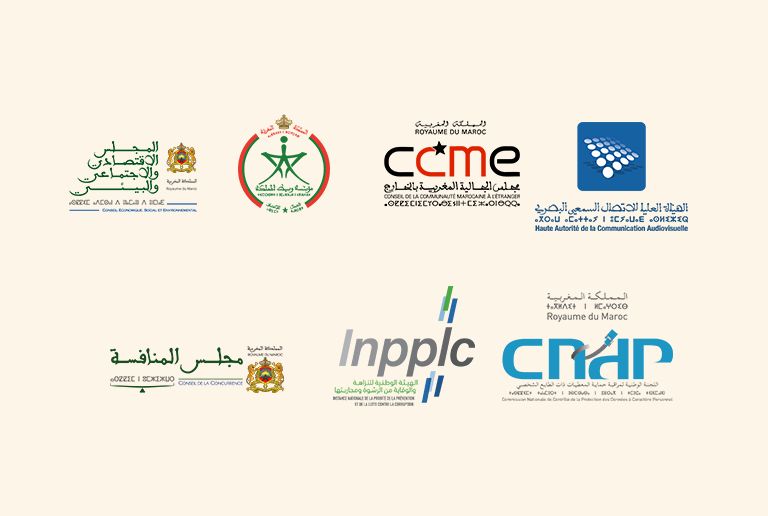
The CCME program at the SIEL was developed in partnership with
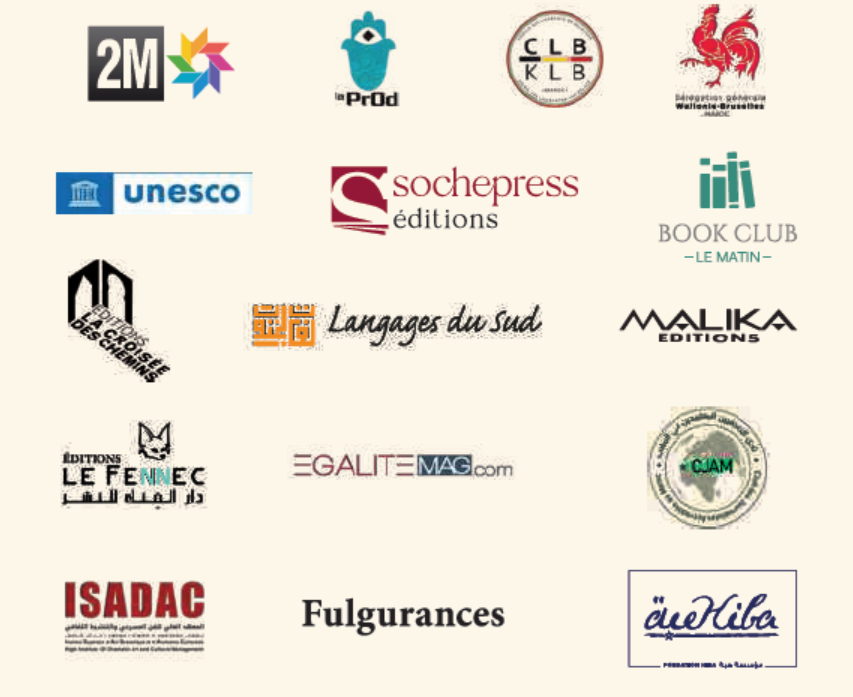
With more than sixty speakers from Morocco and nine other countries (Germany, Belgium, Spain, the United States, France, Italy, the Netherlands, the United Kingdom and Qatar), approximately twenty partners involved in developing the programme and a shared pavilion with six other institutions active in the promotion of human rights, good governance, human development and participatory democracy, the CCME is proposing a series of events to highlight what it has to offer at the 29th edition of the Salon international de l'édition et de le livre (SIEL). These are some of the themes that the CCME is proposing for the 29th edition of the Salon international de l'édition et du livre (SIEL) under the title: “Ecrire le Maroc, raconter le monde”.
Here we are at our first book fair without you, dear friend. Just as we missed you a few weeks ago in Oujda, at the fourth edition of the Maghreb Book Fair, which you never missed. We will therefore no longer see you wandering the alleys of the fair, saluting your friends, colleagues and authors, and always standing on your book stand, except on a few occasions last year when illness began to take its grip on you. Always on your feet, except for a few times last year, when your fatigue began to claim you. Standing on the Croisée des chemins stand, handing out books and offering comments on your latest publications. You were enthusiastic and tireless. Curious and inventive, always open to new publishing adventures.
The 29th edition of the International Book and Publishing Fair (SIEL) was officially opened on Thursday 9 May 2024 at the Espace OLM Souissi in Rabat by the Head of Government, Mr Aziz Akhannouch, and Mr Mehdi Bensaid, Minister for Youth, Culture and Communication.
- More and more Moroccans living abroad are moving to Morocco’ Najat Vallaud-Belkacem
- Oujda: The Moroccan Human Rights Organisation reaffirms its commitment to promoting migrants and asylum seekers rights
- Mr. Driss El Yazami takes part to a national conference on Human Rights Day
- IOM Praises Morocco As Champion of Global Compact for Safe, Orderly, Regular Migration
- Doha: Four Moroccans awarded of the Sheikh Hamad Prize for Translation and International Understanding

